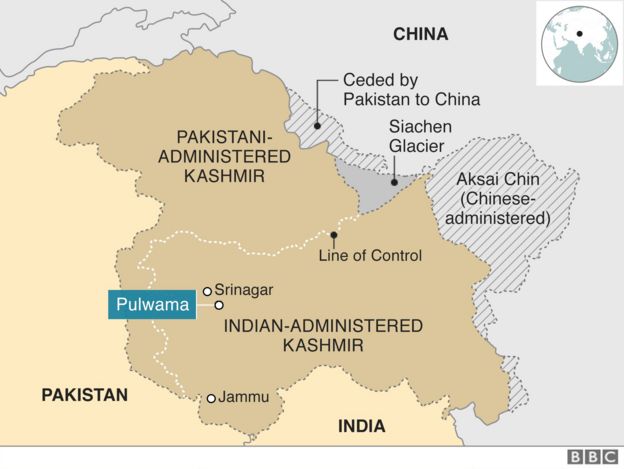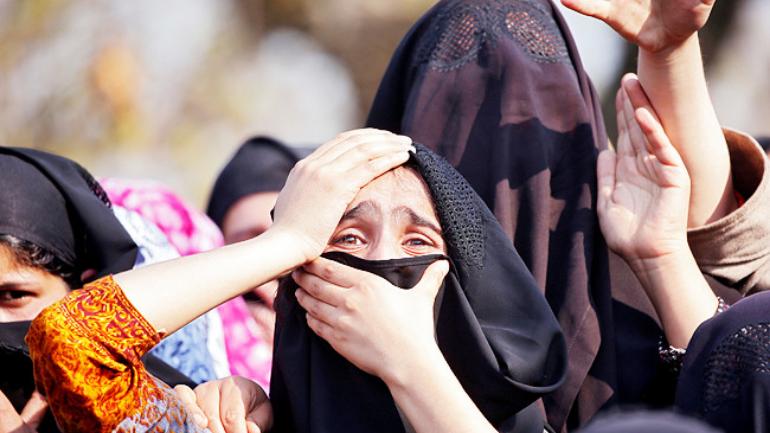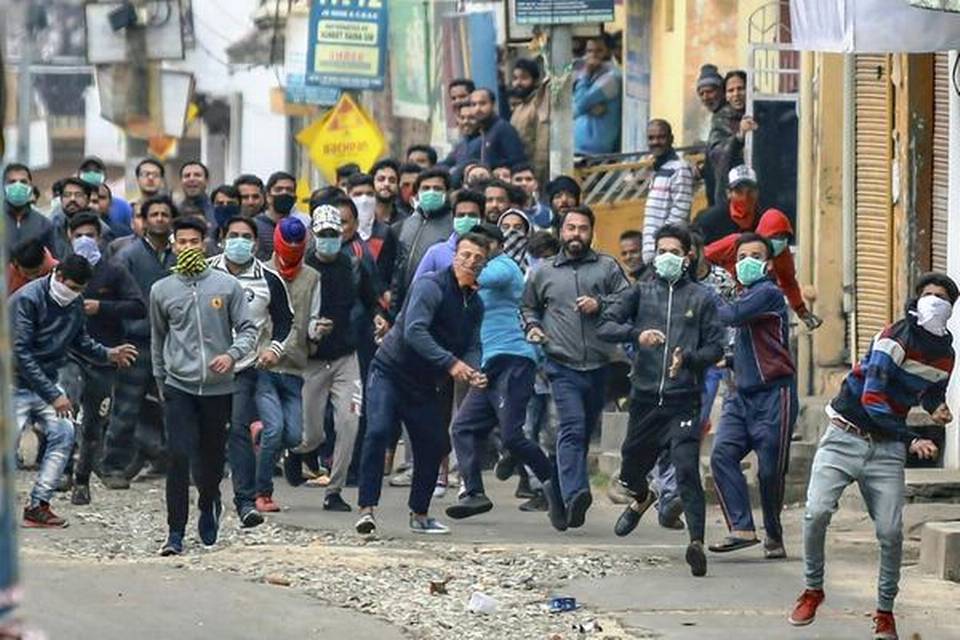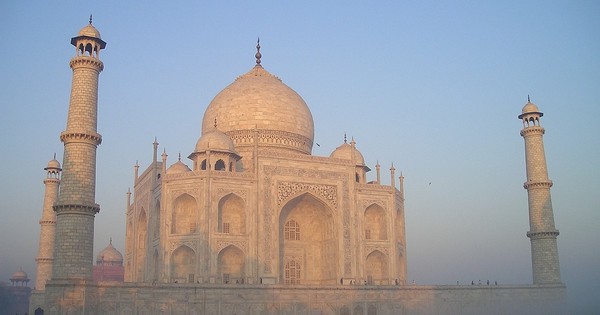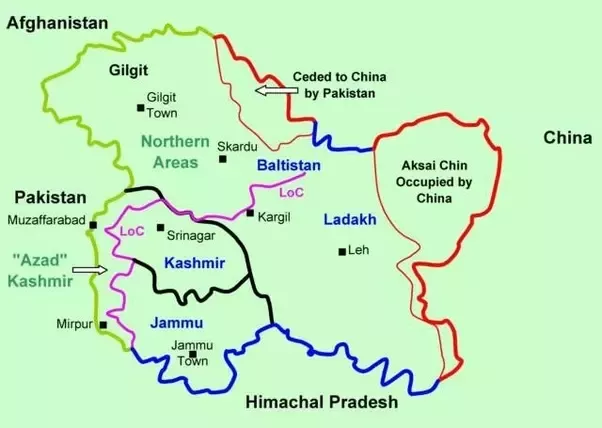Some recent reports on the suicide attack. Parent's of the suicide bomber state "their Son was radicalized after an 2016 incident" while he was with other friends on his way home from school. Shortly after, he disappeared and the Family spent 3 months searching for him, then gave up.
Some information is presented on the Paramilitary Police and that they are part of the Central Reserve Police Force (CRPF). The 3rd article gives a better understanding of the conflict between India and Kashmir and a short history. China also posses a land claim (one-third) in this area.
A suicide bomber who killed 44 paramilitary policemen in Indian-controlled Kashmir joined a militant group after having been beaten by troops three years ago, his parents told Reuters on Friday.
February 15, 2019 - Kashmir suicide bomber radicalized after beating by troops, Parents say
Kashmir suicide bomber radicalized after beating by troops, parents...
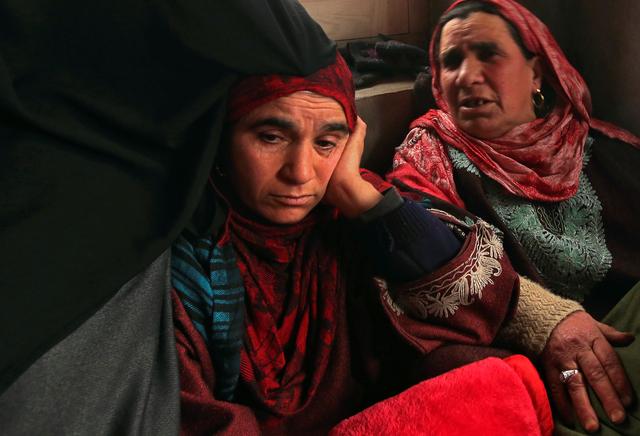
Fahmeeda (L), mother of Adil Ahmad Dar, who according to police carried out the suicide attack on the Central Reserve Police Force (CRPF) convoy and killed 44 on Thursday, sits inside her home in Gundbagh village in south Kashmir's Pulwama district, February 15, 2019. REUTERS/Danish Ismail
Adil Ahmad Dar, 20, from the village of Lethipora in Indian Kashmir, rammed a car full of explosives into the convoy, escalating tension between the nuclear-armed neighbors, which both claim the rugged Himalayan region.
“We are in pain in the same way the families of the soldiers are,” said farmer Ghulam Hassan Dar, adding that his son had been radicalized after police stopped him and his friends on the way home from school in 2016.
“They were stopped by the troops and beaten up and harassed,” Dar said, adding that the students were accused of stone-pelting. “Since then, he wanted to join the militants.”
A video released by the militant group after the attack showed his son, dressed in military fatigues and carrying an automatic rifle, detailing his plan to carry out the bombing. His mother, Fahmeeda, corroborated her husband’s account.
“He was beaten by Indian troops a few years back when he was returning from school,” she said. “This led to anger in him against Indian troops.”
Both parents said they were unaware of their son’s plan to attack the convoy.
Dar did not return home from his work as a laborer on March 19 last year, Fahmeeda added. “We searched for him for three months,” she said. “Finally we gave up efforts to bring him back home.”
Slideshow (3 Images)
Kashmir suicide bomber radicalized after beating by troops, parents...
The 44 Indian paramilitary police killed by a suicide attack in Kashmir on Thursday were part of a force that is little appreciated, poorly paid and under resourced when compared with the army, according to former senior officers.
February 15, 2019 - Attacked Paramilitary Force is a poor cousin to India's Army: former officers
Attacked paramilitary force is a poor cousin to India's army:...
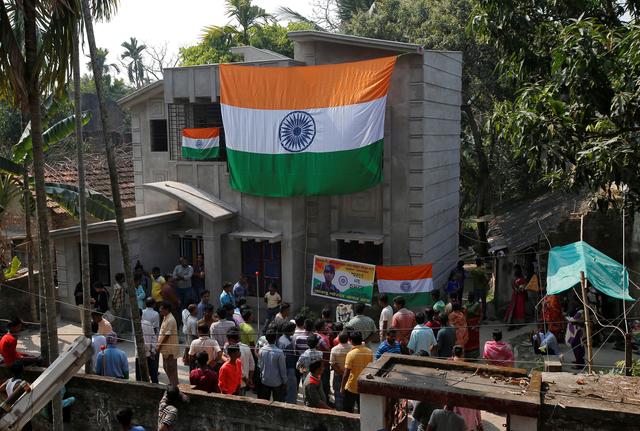
People stand outside the house of Bablu Santra, a Central Reserve Police Force (CRPF) member, who was killed after a suicide bomber rammed a car into the bus carrying CRPF personnel on Thursday, at Bauria village in Howrah district in the eastern state of West Bengal, India, February 15, 2019. REUTERS/Rupak De Chowdhuri
The dead came from towns and villages across India, from Assam in the remote northeast to Tamil Nadu in the south.
But their job in the Central Reserve Police Force (CRPF) took them to some of the most dangerous frontlines in India, including the fight against militants in Indian-controlled Kashmir.
“CRPF has been tasked to be first responder in insurgent situations. This is the primary task,” said Pranay Sahay, a former CRPF director general.
They fight alongside the army, yet they are paid less and get fewer benefits and less training, former officials said.
A low-ranking army soldier typically receives one-and-a-half times the pay of a CRPF officer of equivalent experience, said Ranbir Singh, general secretary of the Confederation of Ex-Paramilitary Forces Welfare Associations, a difference which is also reflected in their pensions.
A spokesman for India’s Home Ministry did not immediately respond to a request for comment. “We almost work in the same situation, in the same place, but definitely the feeling in the force is that we’re not treated on par,” a former CRPF director general said, asking not to be named.
“We’re like a body,” he said, referring to all the security forces, including the army. “Just because the heart is more important, you can’t ignore the knee.”
Living conditions are poorer, a sensitive issue when so many of the police are so far away from home, former officers said. Suicide rates are much higher than in the army, they added.
The housing satisfaction level in the CRPF is the poorest, probably around 13-14 percent,” Sahay told Reuters. Many had to pay for private accommodation for their families because the CRPF could not provide a decent alternative, he added.
One of those who died in Thursday’s attack was Bablu Santra, who had been in the CRPF for 19 years.
Family and friends gathered at his home in Bauria village, about 40 km (25 miles) from the eastern city of Kolkata, on Friday, lighting candles in front of his portrait. An Indian flag hung across the unpainted, incomplete two-storied building.
“He was looking forward to coming back and completing the house,” said Chandan Das, Santra’s nephew. “But that won’t happen now.”
The Muslim-majority Himalayan region of Kashmir has been at the heart of more than 70 years of animosity, since the partition of the British colony of India into the separate countries of Muslim Pakistan and majority Hindu India.
February 15, 2019 - Explainer: Scenic Kashmir at the heart of India-Pakistani animosity
Explainer: Scenic Kashmir at the heart of India-Pakistani animosity
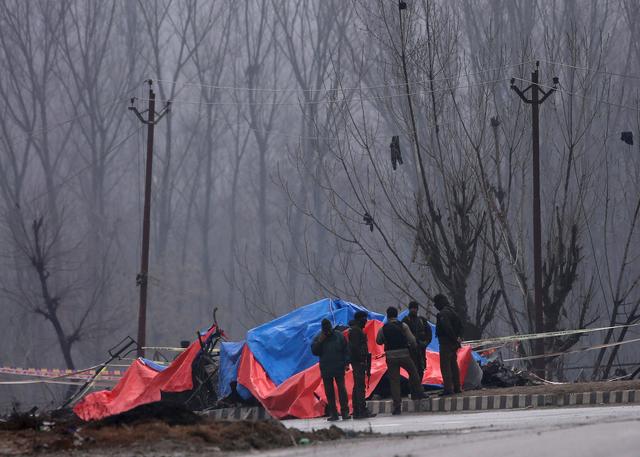
Forensic and security officials stand next to the wreckage of a bus after a suicide bomber rammed a car into the bus carrying Central Reserve Police Force (CRPF) personnel on Thursday, in Lethpora in south Kashmir's Pulwama district, February 15, 2019. REUTERS/Danish Ismail
The scenic mountain region is divided between India, which rules the populous Kashmir Valley and the Hindu-dominated region around Jammu city, Pakistan, which controls a wedge of territory in the west, and China, which holds a thinly populated high-altitude area in the north.
Since both India and Pakistan tested nuclear weapons in 1998, Kashmir has become one of world’s most dangerous flashpoints.
Here are some facts about the region.
HISTORY
After partition of the subcontinent in 1947, Kashmir was expected to go to Pakistan, as other Muslim majority regions did. Its Hindu ruler wanted to stay independent but, faced with an invasion by Muslim tribesmen from Pakistan, hastily acceded to India in October 1947 in return for help against the invaders.
WARS
The dispute over the former princely state sparked the first two of three wars between India and Pakistan after independence 1947. They fought the second in 1965, and a third, largely over what become Bangladesh, in 1971.
DIVISIONS
A U.N.-monitored ceasefire line agreed in 1972, called the Line of Control (LOC), splits Kashmir into two areas - one administered by India, one by Pakistan. Their armies have for decades faced off over the LOC. In 1999, the two were involved in a battle along the LOC that some analysts called an undeclared war. Their forces exchanged regular gunfire over the LOC until a truce in late 2003, which has largely held since.
THE INSURGENCY
Many Muslims in Indian Kashmir have long resented what they see as heavy-handed New Delhi rule. In 1989, an insurgency by Muslim separatists began. Some fought to join Pakistan, some called for independence for Kashmir. India responded by pouring troops into the region. India also accused Pakistan of backing the separatists, in particular by arming and training fighters in its part of Kashmir and sending them into Indian Kashmir. Pakistan denies that, saying it only offers political support to the Kashmiri people.
INDIAN KASHMIR
Governed as the northernmost state of Jammu and Kashmir. It has two capitals, Jammu in winter (November-April), Srinagar in summer (May-October).
New Delhi claims the whole of Jammu and Kashmir as an integral part of India because the Hindu maharaja finally agreed to join India in October 1947.
PAKISTANI KASHMIR
Consists of the smaller Azad Kashmir (“Free Kashmir”) and the Northern Areas, which also formed part of the state before independence. Pakistan says a U.N.-mandated referendum should take place to settle the dispute over the region, expecting that the majority of Kashmiris would opt to join Pakistan.
CHINA
Controls a third section, the remote Aksai Chin plateau, historically part of Ladakh. India fought a border war over Aksai Chin with China in 1962, after China occupied a 38,000 square km (14,000 square mile) chunk of territory.
GEOGRAPHY
Parts of Kashmir are strikingly beautiful with forest-clad mountains, rivers running through lush valleys and lakes ringed by willow trees. The western Himalayan region is bounded by Pakistan to the west, Afghanistan to the northwest, China to the northeast, and India to the south.
POPULATION
Ten million in Indian Kashmir and more than three million in Pakistani Kashmir. About 70 percent are Muslims and the rest Hindus, Sikhs and Buddhists.
AREA
With an area of 222,236 square km (85,783 sq miles), it is slightly bigger than the U.S. state of Utah and almost as big as Britain. India controls 45 percent, in the south and east, Pakistan about a third in the north and west, and China the rest.
ECONOMY
About 80 percent agriculture-based. Crops include rice, maize, apples, saffron. The area is also known for handicrafts such as carpets, woodcarving, woolens and silk. Tourism, once flourishing, has been badly hit by the conflict.
Pakistan summons Indian envoy over Kashmir incident: foreign office official
Pakistan summoned India's deputy head of mission to Islamabad on Friday after Prime Minister Narendra Modi accused Pakistan of involvement in a suicide attack that killed 44 policemen in Kashmir, a foreign office official said.
India, Pakistan to argue at World Court amid tensions
The World Court will hear arguments on Monday in a dispute between India and Pakistan about a former Indian navy commander sentenced to death by Islamabad for allegedly being an intelligence agency spy.
India's PM Modi warns Pakistan of strong response to Kashmir attack
India's Prime Minister Narendra Modi warned Pakistan on Friday to expect a strong response to a suicide attack that killed 44 paramilitary policemen in Kashmir, ratcheting up tension between the nuclear-armed neighbors.
